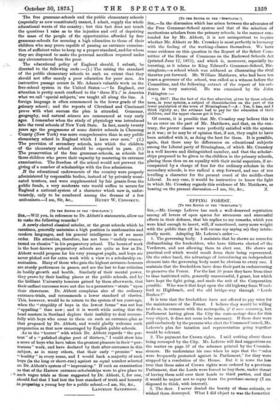[TO THE Rorroa OF TEl " ancreaoR.1
Sra,—In the discussion which has arisen between the advocates of the Free Grammar-School system and that of the selection of meritorious scholars from the primary schools, in the manner eon- tended for by Mr. Abbott, it is not unimportant to inquire whether Mr. Abbott or Mr. Crosskey is most perfectly in harmony with the feeling of the working-classes themselves. We have some evidence on this question in the Report of the Select Com- mittee of the House of Commons on the Endowed Schools Act (printed June 17, 1873), and which is, moreover, especially in- teresting, as it relates to King Edward's Grammar-School, Bir- mingham,--a school which was adduced as illustrating the rival theories put forward. Mr. William Matthews, who had been ten years a governor of the school, was called as a witness before the Committee, and the following extract of the report of his evi- dence is very material He was examined by Sir John Pakington
Q. 3067: Has the fact of the free education given by those schools been, in your opinion, a subject of dissatisfaction on the part of the lower population of the town of Birmingham : Yes, it has, and I think rightly so; the artisans had to pay for the education of their children, and the upper classes got it free."
Of course, it is possible that Mr. Crosskey may believe this to be an error on the part of Mr. Matthews, and that, on the con- trary, the poorer classes were perfectly satisfied with the system as it was ; or he may be of opinion that, if not, they ought to have been satisfied with it, as doing the best for them. It is possible, again, that there may be differences on educational subjects among the Liberal party of Birmingham, of which Mr. Crosskey is a well known and distinguished member, and that the scholar- ships proposed to be given to the children in the primary schools, placing them thus on an equality with their social superiors, if ac- companied by a charge of fees for the ordinary scholars in the secondary schools, is too radical a step forward, and one of too levelling a character for the present creed of the middle-class Liberal. In any case, it would be instructive to know the light in which Mr. Crosskey regards this evidence of Mr. Matthews, as bearing on the present discussion.—I am, Sir, &c., Z.


































 Previous page
Previous page